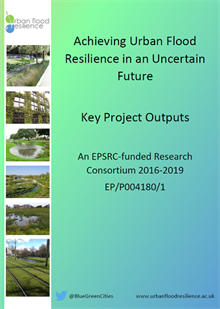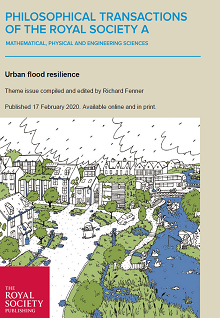Project Overview
The Urban Flood Resilience project ran from October 2016 to June 2021.
The research team investigated how planning, design, operation and organisation of both existing and new urban water systems might be envisaged and transformed in order to deliver multiple benefits (including flood resilience) under flood, normal and drought conditions.
The research was divided into five work packages (WP) to deliver three key elements of the research:
- Engineering design to enhance service delivery
- Engineering development for resource use across the drought-flood spectrum
- Urban flood risk management at the heart of urban planning at multiple scales
Recent Publications
Ferguson C, and Fenner RA. (2021) How natural flood management helps downstream urban drainage in various storm directions. Proceedings of the Institution of Civil Engineers - Water Management.
Pluchinotta I, Pagano A, Vilcan T, Ahilan S, Kapetas L, Maskrey S, Krivtsov V, Thorne C, O’Donnell E. (2021) A Participatory System Dynamics model to investigate sustainable urban water management in Ebbsfleet Garden City. Sustainable Cities and Societies, 67, 102709.
Birkinshaw SJ, O'Donnell G, Glenis V, Kilsby C. (2020). Improved Hydrological Modelling of Urban Catchments Using Runoff Coefficients. Journal of Hydrology, 125884.
Thorne et al., (2020) Blue-Green Cities: Integrating urban flood risk management with green infrastructure. ICE Publishing (book).
O'Donnell E, Thorne C, Yeakley JA, Chan F. (2020) Sustainable Flood Risk and Stormwater Management in Blue-Green Cities; an Interdisciplinary Case Study in Portland, Oregon. Journal of the American Water Resources Association 56, 757-775.
Ferguson C. and Fenner R. (2020) The impact of Natural Flood Management on the performance of surface drainage systems: A case study in the Calder Valley. Journal of Hydrology 590, 125354.
Qi Y, Chan FKS, Thorne C, O'Donnell E, Quagliolo C, Comino E, Pezzoli A, Li L, Griffiths J, Sang Y. and Feng M. (2020) Addressing Challenges of Urban Water Management in Chinese Sponge Cities via Nature-Based Solutions. Water 12, 2788.
Ferguson, CR. and Fenner RA. (2020) The potential for natural flood management to maintain free discharge at urban drainage outfalls. Journal of Flood Risk Management, e12617.
Krivtsov V, Arthur S, Buckman J, Kraiphet A, Needham T, Gu W, Gogoi P, Thorne C. (2020) Characterisation of suspended and sedimented particulate matter in blue-green infrastructure ponds. Blue-Green Systems 2, 214-236.
Maskrey S, Vilcan T, O’Donnell E and Lamond J. (2020) Using Learning and Action Alliances to build capacity for local flood risk management. Environmental Science and Policy, 107, 198-205.
Various (2020). Philosophical Transactions A, Urban Flood Resilience special issue. http://bit.ly/TransA2168
O'Donnell E, and the Urban Flood Resilience team (2019). The blue-green path to urban flood resilience. Blue-Green Systems, 2(1), 28-45.
Research Themes
WP1 Resilience: investigated how blue-green and grey approaches can be optimally combined under different future scenarios
WP2: Resource: explored how stormwater can be used in both individual buildings and in the urban environment.
WP3: Interoperability: investigated how flood risk resilience measures affect mutiple urban infrastructure systems
WP4: Interactions: explored citizens' interactions with blue-green and grey infrastructure
WP5: Practice: tested and applied our research two case study cities: Newcastle (retrofit) and Ebbsfleet (new build)
Key Project Outputs 2019

Published March 2019 (PDF 4.2 MB)
Meet the Team
Urban Flood Resilience is a multi-disciplinary research project led by Colin Thorne and Emily O'Donnell at the University of Nottingham.
Meet the Urban Flood Resilience team.
Case Study research
Research focused on two case studies (see WP5):
- Newcastle (UK): to investigate how urban flood resilience can be achieved through retro-fit, in the context of urban renewal
- Ebbsfleet (UK) to investigate how urban flood resilience can be achieved in the context of new build in a ‘garden city’
Urban Flood Resilience special issue
Royal Society Publishing has recently published a special issue of Philosophical Transactions A entitled Urban Flood Resilience compiled and edited by Richard Fenner. Articles can be accessed at http://bit.ly/TransA2168.
Download the flyer (PDF).

Launch of the 2019 Blue-Green Declaration
The Blue-Green Path to Urban Flood Resilience
On 7th March 2019 we held an event in Newcastle showcasing progress with implementation of Blue-Green infrastructure in Newcastle and the wider NE. The achievements of the signatories of the 2016 Newcastle Declaration on Blue and Green Infrastructure were celebrated and new organisations committed to the Declaration. The Urban Flood Resilience team presented key research outputs to date (detailed in the Key Project Outputs report) and the 2019 Declaration was launched.
Sponsored by:

Presentations, speaker biographies and more details are available on our dissemination event page.